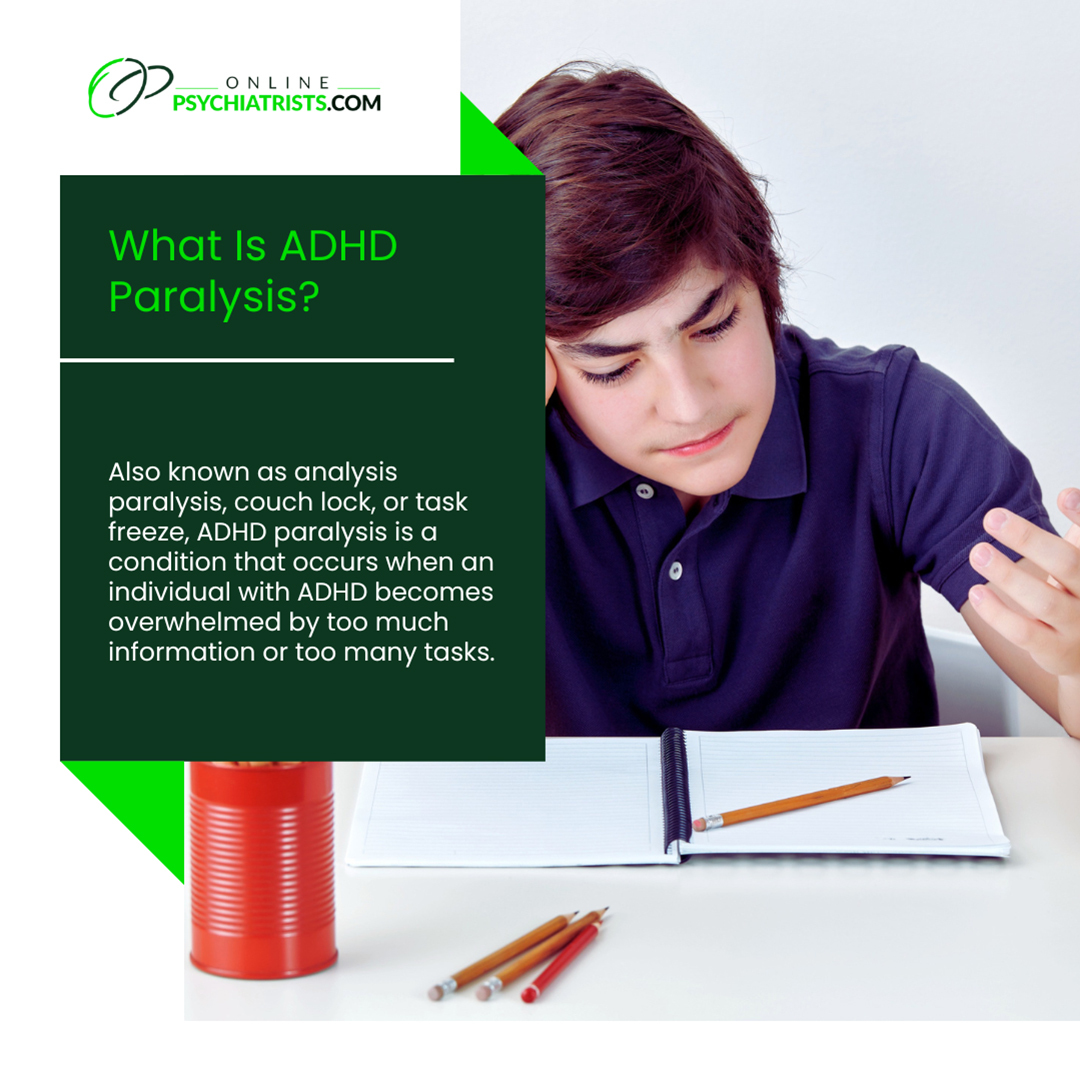

ADHD paralysis may leave you feeling overwhelmed, frozen in place, and unable to think about what to do. Dealing with ADHD paralysis is not easy as it can get in the way of pursuing your academic, career, or personal goals, but with proper strategies, treatment, and support, you can overcome it and accomplish what you want to do. Call Dr. Zlatin Ivanov to learn how you can modify and implement strategies to fit into your routine and lifestyle. Dr. Ivanov focuses on your situation and symptoms and ensures you reach your mental health goals and enjoy the beauty of life in a healthy way.
Anyone can experience analysis paralysis at times, but for people with an ADHD diagnosis, ADHD paralysis is not unusual, and they may experience it every day. Starting a large, complex project can seem extremely daunting for them. Even if they manage the project, they might have trouble maintaining their focus and attention, get stuck with minor details, or become distracted altogether.
Also known as analysis paralysis, couch lock, or task freeze, ADHD paralysis is a condition that occurs when an individual with ADHD becomes overwhelmed by too much information or too many tasks. People experiencing ADHD paralysis find it challenging to begin a task, assignment, or project as they feel apprehensive and overwhelmed.
Analysis paralysis is very challenging to deal with, especially for people with ADHD, as making executive decisions like finding attention deficit disorder treatment NYC becomes extremely difficult when you are overwhelmed by ADHD symptoms. It is necessary to connect with a licensed and board-certified ADHD-trained medical provider who can diagnose your condition and prescribe the best treatment.

No two adults will experience the same ADHD paralysis symptoms, but general symptoms resulting from attention deficit hyperactivity disorder include:
Read more: 5 Most Common Behavioral Issues
ADHA paralysis occurs when individuals already suffering from ADHD feel overwhelmed by information or tasks. Initiating tasks becomes a challenge due to apprehension, and they start feeling overwhelmed. Starting complex projects becomes daunting, and maintaining focus and attention gets very difficult.
The main reason behind ADHA paralysis is impaired executive function, also called executive dysfunction. Executive function regulates attention, information processing, and decision-making, and dysfunction in ADHD looks like challenges with working memory, cognitive flexibility, and inhibitory control. Challenges with memory disrupt task processing, cognitive flexibility limits adaptation to new information, and inhibitory control leads to increased susceptibility to distractions.
All these factors result in mental, choice, or task paralysis:
Each type of paralysis makes it difficult or even impossible to complete tasks, making people with ADHD appear lazy, even though they are not.
It is essential to distinguish ADHD paralysis from depression and procrastination. While ADHD paralysis inhibits task initiation or completion, depression affects mood, emotions, behavior, and overall engagement and enjoyment.
Also, procrastination is not exclusive to ADHD. It can affect people with anxiety or who simply do not feel the motivation to complete certain tasks. With ADHD paralysis, an individual wants to do something or complete the assigned tasks but cannot do so due to executive dysfunction.
Executive dysfunction is a term that describes problems an individual faces due to executive functions, such as the ability to make and change plans, monitor and regularize their behaviors, manage time effectively, and organize thoughts. It is a behavioral symptom that occurs when the brain has difficulty with key functions related to memory, attention, and thinking.
It is most common with certain mental health conditions, especially addictions, behavioral disorders, brain development disorders, and mood disorders.
People with ADHD often have trouble with three main areas of executive functioning:
An individual experiencing ADHD paralysis experiences a problem in one or more of these three areas.
Working memory helps to hold, process, and reproduce essential bits of information in a limited capacity. It is an essential part of the brain’s information-processing system. Even something as simple as remembering a phone number involves working memory.
It is significant for critical thinking, reasoning, problem-solving, and decision-making. People with impaired working memory find it tough to process, order and execute different tasks.
It is the ability to change thoughts and behaviors and adapt to new and developing information. People with cognitive inflexibility face problems adapting to changes taking place around them or when things do not go as planned.
People with ADHD paralysis may be unable to process new and developing information as they lack the cognitive abilities to adjust to changes to plans or the circumstances affecting them.
It is a self-regulating mechanism that prevents people from giving in to all sorts of impulses and behaviors. Individuals with impaired inhibitory control may be more impulsive or carry out inappropriate behaviors and aggression.
People with ADHD who lack inhibitory control may be able to shake off the effects of ADHD paralysis with it occurs. They may be less resistant to distractions and procrastination as they have trouble regulating their responses to these distractions.
There are three major types of ADHD paralysis that many people with ADHD can experience.
They are:
Some symptoms of depression overlap with symptoms of ADHD paralysis. People who are depressed may find it challenging to engage in activities they used to enjoy and may put off work or start a new task as they are overwhelmed by feelings of sadness and worthlessness. These feelings prevent them from getting started or doing any worthy.
Due to the similarities in symptoms between the two mental disorders, it often becomes tough to detect which mental health disorder an individual is suffering from. However, distinguishing between ADHD paralysis and depression can prevent you from making important decisions or completing work, the difference between the two lies in the inability to start or finish a task.
People who are depressed find it difficult to do anything and everything. On the other hand, people with ADHD can usually do things that interest them with little or no issues. It is the activities they don’t enjoy that can lead to distraction, and they become paralyzed.
Distinguishing between ADHD paralysis and procrastination is also essential to make an accurate diagnosis of the condition. Even though procrastination is associated with ADHD, it is not a widely recognized sign unique to attention deficit hyperactivity disorder. Anyone can procrastinate from time to time, regardless of their mental health.
However, people with ADHD paralysis may experience more extreme cases of procrastination. ADHD paralysis involves overwhelming feelings of indecision and uncertainty that can affect the ability to start a task, and it is very different from putting off doing something or completing a task just because it is not fun. Procrastination is more severe in people who have executive functioning impairment.
Read more: What Is Somatic Experiencing Therapy?
ADHD paralysis is frustratingly real. But you can get yourself back in motion by understanding and addressing its causes. Treating ADHD is the best way to alleviate ADHD paralysis. Mental healthcare providers recommend a combination of ADHD medication and talk therapy for identifying and addressing the negative thoughts that influence behavior.
Along with the standard ADHD treatment approaches, some behavioral changes can help to manage symptoms of ADHD paralysis better. Building strategies into routines can help with organizing and prioritizing responsibilities at work, school, or home.
Some of these strategies include:
Planning ahead of time and keeping a planner to manage where you must be can help to prevent feelings of overwhelm and avoid ADHD paralysis. Writing down on the calendar can keep you aware of what to do, where you must be, and who you should see. Planning tasks protect against ADHD paralysis as it keeps events and obligations from creeping up.
Sensory overload can lead to ADHD paralysis. Too much screen time can overwhelm the senses and causes them to shut down. People with ADHD should go out of their way to control the environment they have to work in when it comes to getting something done. Minimizing noise and visual distractions can help prevent digital overstimulation and get things done in a better way.
Overthinking about a problem and its possible solutions can lead to further problems. While reviewing and assessing are essential, overdoing is counterproductive. ADHD paralysis can be avoided by trusting your instinct. At times the first instinct may not be the best of ideas, but it is the most effective way to get going and started with a task.
The best way to stop feeling overwhelmed by the prospect of a large project, task, or assignment is to stop thinking about it as something massive or unsurmountable. Small, less intimidating tasks are easy to manage, simple to do, and can be completed effectively. Smaller tasks help people with ADHD paralysis maintain focus and achieve success.
Celebrate any achievements and reward yourself when you complete a task successfully. Associating a job well done with the positive feelings of a reward is a good habit and creates a behavioral incentive to follow the pattern and prevent ADHD paralysis from undoing what you have accomplished. Rewards can be something as simple as an extra scoop of ice cream or a meal at your favorite restaurant.
A licensed and experienced ADHD healthcare provider can help you get the best treatment to manage ADHD symptoms and paralysis. He will diagnose your condition accurately and come up with a personalized treatment plan that provides relief. They have therapies, strategies, and coping mechanisms that improve your quality of life.
Living with ADHD paralysis is not easy, but you don’t have to go through it alone. Online Psychiatrists offer the best solutions by connecting you with board-certified, licensed, and experienced mental healthcare providers who make an accurate diagnosis based on your symptoms. Dr. Zlatin Ivanov helps you handle ADHD paralysis by recommending treatment plans and strategies in your routine that help to organize and prioritize your life at work, school, and home effectively. With timely support and guidance, you can make your life as easy and simple as possible.

Dr. Zlatin Ivanov, MD, is an adult psychiatrist specializing in addiction treatment, ADHD, anxiety, depression, and OCD. He offers exceptional talk therapy and medication management through online video conferencing.
Dr. Ivanov is double board certified in Psychiatry and Clinical Neurology and a member of the American Psychiatric Association. His medical career is colored by many outstanding contributions to medicine, including several publications, research, and scientific presentations. An attending psychiatrist at Woodhull Medical Center in Brooklyn, NY, and Bellevue Hospital Center in New York City, he takes the time to listen to patients and makes sure they know he is committed to their unique situation.
 Our Locations
Our Locations
The Chrysler Building
405 Lexington Ave, #2601
New York, NY, 10174 (map)
300 Carnegie Center Drive #150K,
Princeton, NJ, 08540 (map)
701 Brickell Avenue, 1550#A,
Miami, FL, 33131 (map)